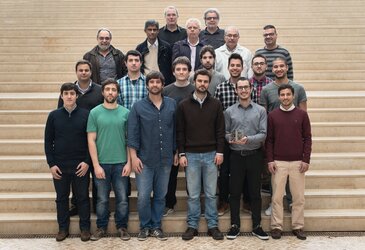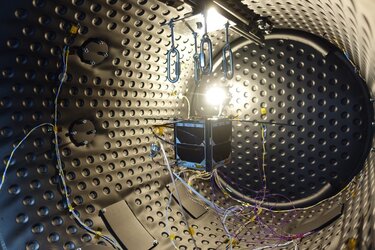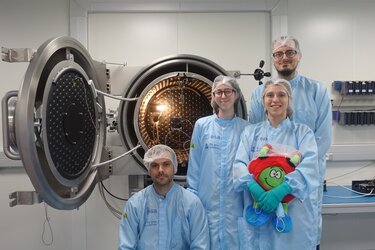Accept all cookies Accept only essential cookies See our Cookie Notice

About ESA
The European Space Agency (ESA) is Europe’s gateway to space. Its mission is to shape the development of Europe’s space capability and ensure that investment in space continues to deliver benefits to the citizens of Europe and the world.
Highlights
ESA - United space in Europe
This is ESA ESA facts Member States & Cooperating States Funding Director General Top management For Member State Delegations European vision European Space Policy ESA & EU Space Councils Responsibility & Sustainability Annual Report Calendar of meetings Corporate newsEstablishments & sites
ESA Headquarters ESA ESTEC ESA ESOC ESA ESRIN ESA EAC ESA ESAC Europe's Spaceport ESA ESEC ESA ECSAT Brussels Office Washington OfficeWorking with ESA
Business with ESA ESA Commercialisation Gateway Law at ESA Careers Cyber resilience at ESA IT at ESA Newsroom Partnerships Merchandising Licence Education Open Space Innovation Platform Integrity and Reporting Administrative Tribunal Health and SafetyMore about ESA
History ESA Historical Archives Exhibitions Publications Art & Culture ESA Merchandise Kids Diversity ESA Brand Centre ESA ChampionsLatest
Space in Member States
Find out more about space activities in our 23 Member States, and understand how ESA works together with their national agencies, institutions and organisations.
Science & Exploration
Exploring our Solar System and unlocking the secrets of the Universe
Go to topicAstronauts
Missions
Juice Euclid Webb Solar Orbiter BepiColombo Gaia ExoMars Cheops Exoplanet missions More missionsActivities
International Space Station Orion service module Gateway Concordia Caves & Pangaea BenefitsLatest
Space Safety
Protecting life and infrastructure on Earth and in orbit
Go to topicAsteroids
Asteroids and Planetary Defence Asteroid danger explained Flyeye telescope: asteroid detection Hera mission: asteroid deflection Near-Earth Object Coordination CentreSpace junk
About space debris Space debris by the numbers Space Environment Report In space refuelling, refurbishing and removingSafety from space
Clean Space ecodesign Zero Debris Technologies Space for Earth Supporting Sustainable DevelopmentLatest
Applications
Using space to benefit citizens and meet future challenges on Earth
Go to topicObserving the Earth
Observing the Earth Future EO Copernicus Meteorology Space for our climate Satellite missionsCommercialisation
ESA Commercialisation Gateway Open Space Innovation Platform Business Incubation ESA Space SolutionsLatest
Enabling & Support
Making space accessible and developing the technologies for the future
Go to topicBuilding missions
Space Engineering and Technology Test centre Laboratories Concurrent Design Facility Preparing for the future Shaping the Future Discovery and Preparation Advanced Concepts TeamSpace transportation
Space Transportation Ariane Vega Space Rider Future space transportation Boost! Europe's Spaceport Launches from Europe's Spaceport from 2012Latest

Students inspecting ISTSat-1 in thermal vacuum chamber
Thank you for liking
You have already liked this page, you can only like it once!
Students inspecting ISTSat-1 in one of ESA's thermal vacuum chambers in Belgium.
ISTsat-1 is the first-ever nanosatellite designed by students from University of Lisbon’s Instituto Superior Técnico and is part of the second edition of Fly Your Satellite! (FYS), an ESA Education program that gives university students the opportunity to design, build, launch, and operate educational satellites.
The Portuguese team travelled to the CubeSat Support Facility (CSF) in ESEC (Redu, Belgium) for environmental tests from 13 to 24 March 2023 in the facility's Thermal Vacuum Chamber (TVAC), which aims at verifying the correct functionality of the spacecraft under space-representative thermal and vacuum environments. The TVAC test is a major milestone for any object bound for space, from smaller CubeSats to large spacecraft.
The University of Lisbon in Portugal has developed the smallest type of CubeSat – a cube just 10 cm wide – that is set to launch on Ariane 6 and will be receiving aircraft ADS-B signals as it orbits overhead at 587 km above our planet. Developed at the university’s Instituto Superior Técnico the satellite is called ISTSat and will weigh just a little over 1 kg using a flat, patch antenna to monitor aircraft for a whole year once launched from the Ariane 6 upper stage.
The data that ISTSat-1 receives from the aircraft flying around the world will be transmitted to a ground station in Portugal and cross-checked with official aircraft ADS-B flight data. If they match, then the students can say they successfully built an operational satellite that flew on the first launch of Europe’s new rocket Ariane 6 – an impressive line to put on your CV.
Europe’s new rocket Ariane 6 is taking with it space missions each with a unique objective, destination, and team, cheering them on. Whether venturing into Earth orbit to study the planet, peering out to deep space, or testing important new technologies, Ariane 6’s first flight will showcase the versatility and flexibility of this impressive, heavy-lift launcher.
-
CREDIT
ESA -
LICENCE
ESA Standard Licence

Student inspecting ISTSat-1 model before vibration test

Members of the ISTSat-1 team, including supervising…

Students running ISTSat-1 test at CubeSat Support Facility

ISTSat-1 ready to be baked















 Germany
Germany
 Austria
Austria
 Belgium
Belgium
 Denmark
Denmark
 Spain
Spain
 Estonia
Estonia
 Finland
Finland
 France
France
 Greece
Greece
 Hungary
Hungary
 Ireland
Ireland
 Italy
Italy
 Luxembourg
Luxembourg
 Norway
Norway
 The Netherlands
The Netherlands
 Poland
Poland
 Portugal
Portugal
 Czechia
Czechia
 Romania
Romania
 United Kingdom
United Kingdom
 Slovenia
Slovenia
 Sweden
Sweden
 Switzerland
Switzerland

























